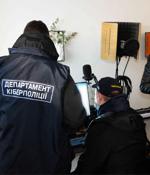Security News

SSU and the Ukrainian secret service say they have identified five members of the Gamaredon hacking group, a Russian state-sponsored operation known for targeting Ukraine since 2014. This Gamaredon hacking group, tracked as Armageddon by the SSU, is allegedly operated under the FSB and is believed to be responsible for over 5,000 attacks in Ukraine since the operation began.

A member of the BlackMatter ransomware gang has publicly claimed the extortionists are shutting down, causing much excitement within the infosec world. A Russian-language message reportedly posted on a forum used by ransomware criminals is said to have announced BlackMatter's second disappearance of 2021, the gang previously pulling a disappearing act under their former name of Darkside.

The Security Service of Ukraine has arrested a team of actors who illegally infiltrated the information system of the National Health Service of Ukraine and entered false vaccination entries for other people. The actors found clients in the Sumy region through a team of doctors who participated in the scheme and offered to create false COVID-19 vaccination certificates for anyone who paid them 3,000 hryvnias.

The Ukrainian cybercrime police force has arrested members of a group of money launderers and hackers at the request of U.S. intelligence services. In a press release by Ukraine's SSU, law enforcement says the individuals engaged in large-scale international operations where they laundered tens of millions of USD for various hacking groups.

Ukrainian law enforcement authorities on Monday disclosed the arrest of a hacker responsible for the creation and management of a "Powerful botnet" consisting of over 100,000 enslaved devices that was used to carry out distributed denial-of-service and spam attacks on behalf of paid customers. The Ukrainian police agency said it conducted a raid of the suspect's residence and seized their computer equipment as evidence of illegal activity.

The BFG is back, but thankfully it wasn't needed inside what looks like a rather modern and upmarket apartment block, because the suspects gingerly opened the door of their own accord when they heard the police outside. The report doesn't list which cryptocurrencies were frozen, and doesn't say whether those assets might ever actually be reclaimable if the suspects are ultimately convicted.

Law enforcement agencies have announced the arrest of two "Prolific ransomware operators" in Ukraine who allegedly conducted a string of targeted attacks against large industrial entities in Europe and North America since at least April 2020, marking the latest step in combating ransomware incidents. The joint exercise was undertaken on September 28 by officials from the French National Gendarmerie, the Ukrainian National Police, and the U.S. Federal Bureau of Investigation, alongside participation from the Europol's European Cybercrime Centre and the INTERPOL's Cyber Fusion Centre.

Europol has announced the arrest of two men in Ukraine, said to be members of a prolific ransomware operation that extorted victims with ransom demands ranging between €5 to €70 million. The international law enforcement operation was conducted in coordination with the FBI, the French police, and the Ukrainian National Police.

The Security Service of Ukraine has taken down a network of six call centers in Lviv, used by a ring of scammers to defraud cryptocurrency investors worldwide. Fraudsters behind these illegal call centers used VoIP phone numbers to hide their locations while scamming thousands of foreign investors.

The Security Service of Ukraine took down a network of cryptocurrency exchanges used to anonymize transactions since the beginning of 2021. "The clandestine cryptocurrency exchanges were in demand because they provided anonymity of transactions and possibility of money laundering," the SBU said.